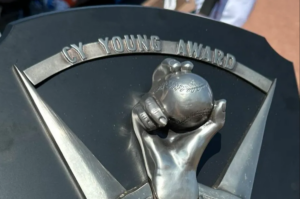Mike Mussina: The consistently consistent Yankees arm
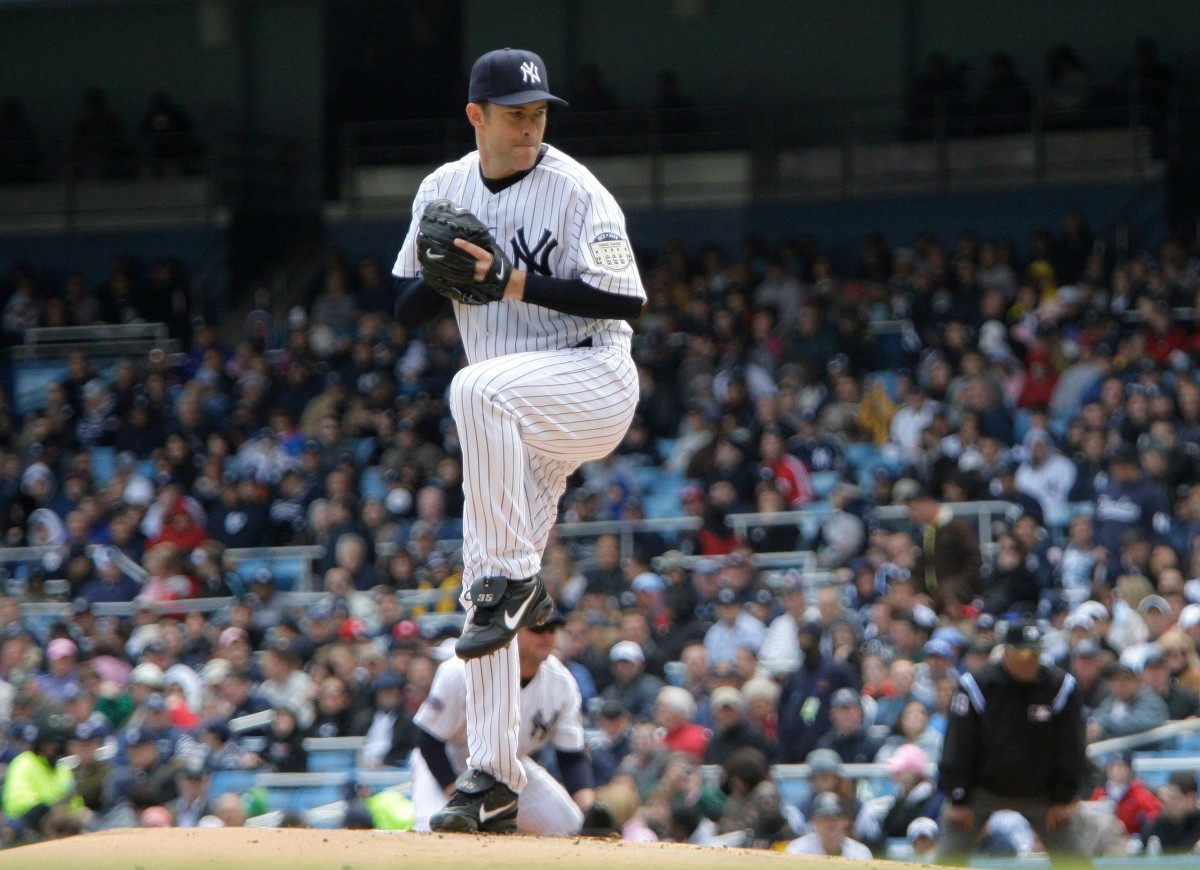
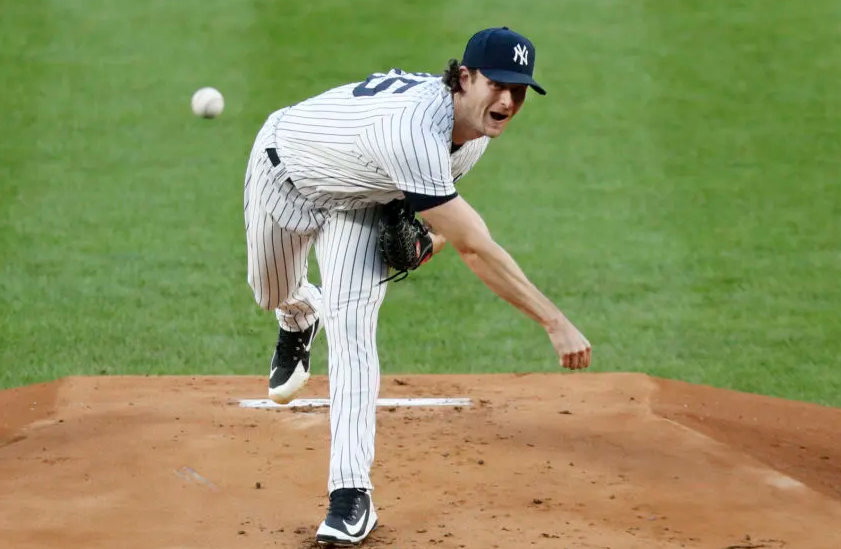
Michael Bennington
More Stories By Michael Bennington
- Mother’s Day: How Anthony Volpe’s mom molded him into a Yankee phenom
- Yankees continue to build depth with two minor deals as big signings on hold
- Yankees treasure up for grab as John Sterling ready to auction World Series rings
- Critical Juan Soto chase forces Yankees coach to put off holiday plans
- Yankees’ Boone beams as Luis Gil’s breakout year earns top MLB rookie honor
Table of Contents
| Position | Pitcher |
| Active years | 1991 – 2008 |
| Teams (years) | Baltimore Orioles (1991–2000) New York Yankees (2001–2008) |
| Draft | Baltimore Orioles in the 11th round of the 1987 MLB |
| Debut | August 4, 1991, Baltimore Orioles vs Chicago White Sox |
| Last game | September 28, 2008, New York Yankees vs Boston Red Sox |
| Date of Birth | December 8, 1968 |
| Native place | Williamsport, PA |
| Batted | Left |
| Threw | Right |
| All-Star | 5× (1992–1994, 1997, 1999) |
| Shirt retired | New York Yankees No. 35 |
| MLB Awards | 7× Gold Glove Award (1996–1999, 2001, 2003, 2008) MLB wins leader (1995) |
| Legacy | Baltimore Orioles Hall of Fame |
| Nickname | Moose |
Mike Mussina, often described as “consistently consistent,” epitomized this quality throughout his illustrious career. His baseball journey culminated when he retired in 2008 after an impressive record of 270 wins over 18 years in the major leagues. What sets Mike Mussina apart is his remarkable streak of 17 seasons with a minimum of 11 wins, an American League record.
Mike Mussina’s career win percentage stands at an impressive .638, a testament to his consistent performance. When it comes to the all-time pitching greats, he ranks 23rd in strikeouts, tallying 2,813 Ks. He’s also 23rd in Wins Above Replacement (WAR) among pitchers, with a career WAR of 82.9. In addition, Mike Mussina sits at the 33rd spot for all-time wins with 270 victories, and he’s started 535 games, ranking 33rd in that category. Mussina’s innings pitched total of 3,562.2 lands him at 66th place in the annals of the sport.
His accolades extend beyond mere numbers. Mike Mussina earned the title of an All-Star five times and secured seven Gold Glove Awards for his exceptional fielding skills. Furthermore, his unwavering excellence led to six top-five finishes in Cy Young Award voting for his respective league.
With a diverse arsenal of pitches including four-seam and two-seam fastballs, a slider, a changeup, and a knuckle curve, Mike Mussina displayed his mastery on the mound. His consistency and excellence in the game earned him a well-deserved place in the Baseball Hall of Fame in 2019.
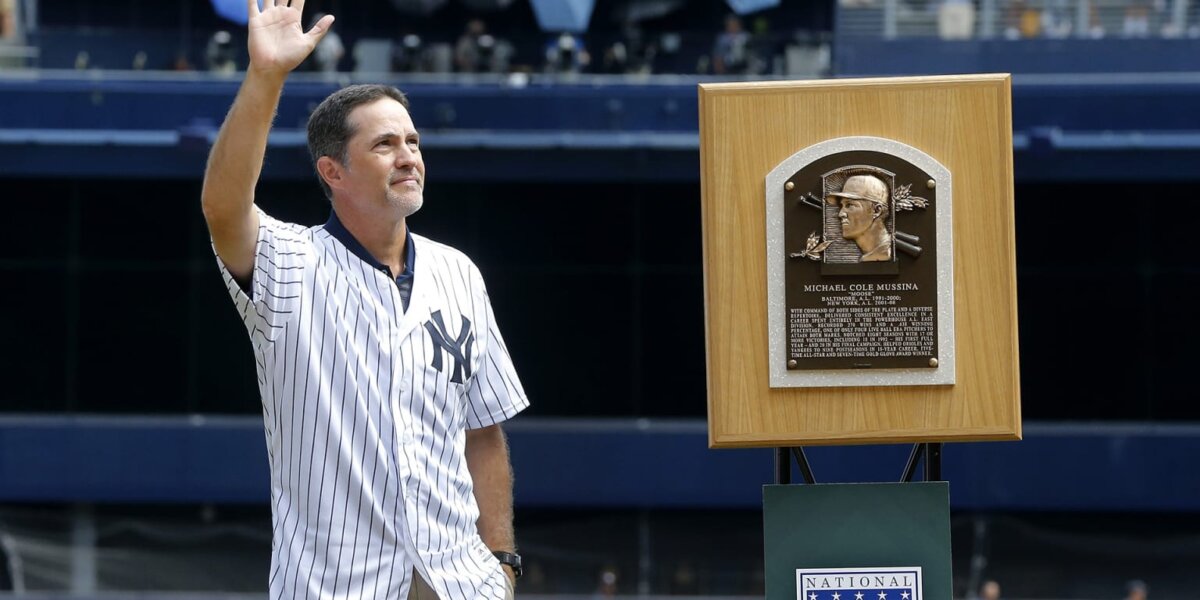
Early life and career of Mike Mussina
Michael Cole Mussina was born on December 8, 1968, in Montoursville, Pennsylvania. He was the eldest child of Malcolm Mussina, a lawyer, and Eleanor (Ellie) Mussina, a nurse. Mike Mussina’s journey as an athlete commenced at a very young age. Remarkably gifted, even as a toddler, he exhibited his athletic potential by throwing perfect football spirals at the tender age of 3. His exceptional drive and talent were evident as he spent countless hours in his youth refining his athletic abilities. Mike Mussina could often be found on nearby fields or in the family basement, where he ingeniously marked a strike zone on the wall using strips of tape.
Mike Mussina’s journey in baseball officially began when he was 8 years old, joining the Montoursville Little League. It was during this time that he acquired his lifelong nickname, “Moose.” This moniker didn’t originate from his stature or temperament but rather from the first syllable of his last name, pronounced meu-SEE-na, which bore a resemblance to the animal.
At the age of 10, Mike Mussina pitched his first game for the Johnny Z’s Restaurant team. His star continued to rise as he donned the number 35 jersey for the Montoursville High School Warriors. During his high school years, he amassed an impressive 24-4 record with a minuscule 0.87 ERA, leading his team to a state championship in his senior year. Mike Mussina’s outstanding achievements didn’t go unnoticed, as he earned the title of Pennsylvania State Baseball Player of the Year twice during his high school career. In the summer months, he showcased his skills on the diamond while playing for the Montoursville American Legion Baseball team.
Mike Mussina’s extraordinary athleticism was not limited to the baseball diamond. He was also a standout on the basketball court and the football field, all while maintaining excellence in his academic pursuits. When Mike Mussina graduated, he held the fourth-highest grade-point average in his class. Interestingly, there’s a hint of speculation that this ranking might have been somewhat intentional. The top three students with the highest grade-point averages were typically required to speak at the graduation ceremony, a prospect that likely fell outside Mussina’s comfort zone.
During his college years, Mike Mussina not only shone in the world of academia but also demonstrated his baseball prowess by playing for Jerseytown, Pennsylvania, in the North Branch Baseball League of PA (NBBL) during the summer.
Mike Mussina’s success on the field paved the way for exciting opportunities, such as a chance to pitch for the USA Junior Olympic Team during the summer between his junior and senior years of high school. His achievements attracted the attention of numerous baseball scouts. However, Mike Mussina had his sights set on college and was considered an extremely challenging prospect to sign directly from high school in 1987.
The Los Angeles Dodgers scouts made enticing promises to Mike Mussina, including a flight to meet team owner Peter O’Malley, along with assurances of rapid advancement to the big leagues. Yet, Chicago Cubs scout Billy Blitzer saw it differently, noting in his report that Mussina was “unsignable.” Mike Mussina had signed a letter of intent with Stanford University, and his father’s prosperous legal career meant he wouldn’t accept anything less than a $250,000 bonus. At the time, this amount would have set a record. The Baltimore Orioles eventually took a chance and drafted Mike Mussina in the 11th round, but they refrained from making a formal offer after the pitcher indicated he wasn’t interested in signing at that time.
Opting for higher education, Mike Mussina enrolled at Stanford University on a partial baseball scholarship. As a freshman, he quickly became a key part of the rotation for the defending College World Series Champion Cardinal. Mike Mussina concluded his freshman year with an impressive 9-4 record and a team-leading 20 starts, contributing to Stanford’s consecutive NCAA championship victories.
Unfortunately, his sophomore year was marred by a shoulder injury, which limited his appearances to just eight games. However, Mike Mussina made a triumphant comeback in his junior season, amassing an impressive 14-5 record over 20 starts. His outstanding performance earned him the title of All-American, and Stanford once again advanced to the College World Series, ultimately losing in the semifinals to the eventual champion, Georgia.
The drafting
After obtaining his degree in economics and joining the Delta Tau Delta fraternity, Mike Mussina once again became eligible for the MLB draft, and this time he was prepared to embark on his professional baseball journey. On June 4, 1990, he was selected by the Baltimore Orioles, chosen as the 20th overall pick in the first round. Mike Mussina signed his contract on July 2, 1990, with a reported signing bonus of $225,000 under the watchful eye of scout Ed Sprague. Following the signing, the Orioles wasted no time in challenging Mike Mussina by assigning him to the Double-A team, the Hagerstown Suns of the Eastern League. On July 19, 1990, he made his eagerly anticipated professional debut.
Mike Mussina’s performance in Hagerstown was nothing short of impressive. He started seven games, ultimately amassing a 3-0 record along with an exceptional 1.49 ERA before advancing to the Triple-A Rochester Red Wings in late August. This promotion to Triple-A was timely, as the Red Wings were making a determined push towards the playoffs. Mike Mussina carried his success to the higher level, pitching with remarkable effectiveness, boasting a 1.35 ERA over 13⅓ innings during the regular season for the Red Wings, a remarkable accomplishment just months after leaving college. Additionally, Mike Mussina made two postseason starts for the team, contributing to their victory in the Governor’s Cup in 1990, although he didn’t secure a win in those particular games.
Following the triumphant season, Mike Mussina returned to Stanford to complete his economics degree, a feat he remarkably accomplished in just 3½ years.
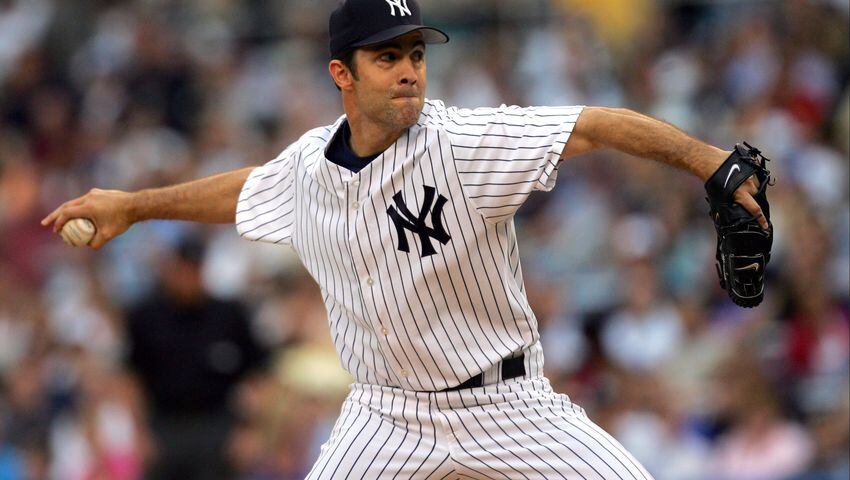
The MLB debut
In the 1991 season, Mike Mussina returned to the Rochester Red Wings, where he continued to showcase his exceptional talent. He managed a remarkable 10-4 record with a 2.87 ERA, earning him the International League Pitcher of the Year Award. It was during this season that Mike Mussina received his first call-up to the big leagues, arriving on July 31. Just a few days later, on August 4, he made his much-anticipated first MLB start. In his debut, Mike Mussina pitched 7⅔ innings and allowed just four hits. Unfortunately, one of those hits was a home run delivered by none other than the future Hall of Famer, Frank Thomas, resulting in a narrow 1-0 loss for Mussina. Throughout the rest of the season, Mike Mussina continued to exhibit his impressive pitching prowess, maintaining an identical 2.87 ERA to his Triple-A performance. For his excellent performance, he was honored with the inaugural Palmer Prize, recognizing him as the top pitcher in the Orioles’ farm system.
The 1992 season solidified Mike Mussina’s status as a bona fide major leaguer. He began the campaign with a perfect 5-0 record and earned his first selection to the All-Star Game, which would become a recurrent honor throughout his career. He also achieved a one-hitter on July 17, facing the Texas Rangers. During this exceptional game, he allowed just one hit, a double by Kevin Reimer. Notably, Mike Mussina led the American League in winning percentage with an 18-5 record. Despite his impressive performance, he finished fourth in the Cy Young Award voting, the first of nine occasions in which he would finish within the top six in voting for this prestigious award, though the coveted top position would always remain just out of reach.
In 1993, Mike Mussina embarked on the season with determination, accumulating a 7-2 record by early June before a pivotal game against the Seattle Mariners on June 6. During that game’s seventh inning, He struck Mariners catcher Bill Haselman with a pitch in the shoulder, who had previously homered. This event sparked a dramatic and intense 20-minute bench-clearing brawl, resulting in three injuries and eight ejections, although Mike Mussina himself was not among those ejected. Subsequently, over his next three starts, Mussina allowed 16 earned runs on 24 hits across a span of 13⅔ innings. He then faced a six-week absence from the game due to a sore right shoulder and lower-back pain. Despite these setbacks, Mike Mussina was selected for the All-Star team, with the game scheduled to take place in Baltimore. AL manager Cito Gaston initially informed Mussina that he was unlikely to play unless the game extended into extra innings.
However, when Mike Mussina took to the bullpen mound independently during the ninth inning for some between-start throwing and was not called into the game, the AL team received a chorus of boos from Baltimore fans as they exited the field following the game. Gaston and Mike Mussina eventually reconciled, and in 1994, Gaston had Mussina pitch the fifth inning of that year’s All-Star Game.
From 1994 to 1996, Mike Mussina came tantalizingly close to achieving a 20-win season. In 1994, he held a 16-5 record when the players’ strike interrupted the season, costing him approximately 10 starts. The following year, in 1995, the pitcher led the American League with 19 victories. However, the strike’s impact resulted in a shortened season, causing Mike Mussina to lose at least three potential starts early in the season. A standout moment in the 1995 season for him was starting and winning the game in which Cal Ripken Jr. broke Lou Gehrig‘s consecutive-game record.
The 1996 season saw Mike Mussina coming even closer to a 20-win campaign, as he had already accumulated 19 wins with four starts remaining in the season. It was during this season that he earned his first of seven Gold Gloves.
In the latter half of the 1996 season, Mike Mussina played with a heavy heart after a tragic plane crash struck his hometown, Montoursville, on July 17. The crash took the lives of 16 students and 5 chaperones who were en route to Paris for a French club trip. Mike Mussina returned home for a memorial service during the season, and as a heartfelt tribute, he pitched the remainder of the season with the names of the 21 victims inscribed on the bill of his cap. His bond with his hometown remained profound as he built a house there and volunteered as a coach for both football and basketball at the local high school during the offseason.
His initial contract with the Orioles was set to expire after the 1997 season. Instead of testing free agency, he chose to sign a widely acknowledged below-market three-season contract worth $21 million in early May. On May 30, 1997, Mike Mussina came remarkably close to making history by taking a perfect game into the ninth inning against the Cleveland Indians. However, he allowed a single to Sandy Alomar Jr. with just one out in the ninth. The pitcher then struck out the next two batters to conclude the game. Less than a month later, on June 25, he took another no-hitter into the eighth inning against the Brewers. The 1997 postseason marked some of the most remarkable moments in Mike Mussina’s career. He started the third game of the ALCS against the Cleveland Indians and allowed just one run over eight innings while striking out an American League postseason record of 15 batters. He followed that outstanding performance by starting Game Six on just three days’ rest and pitched eight shutout innings with 10 strikeouts. Mike Mussina continued his excellence throughout the entire 1997 postseason, conceding only four runs over 29 innings.
In the fall of 1997, Mike Mussina and Jana Lentz McKissick were married on November 1. Lentz McKissick, also hailing from Montoursville, was two years ahead of him in high school. It was her second marriage, and Mike Mussina adopted her daughter, Kyra, who was 8 years old at the time of their marriage. The couple had two sons, Brycen, born in 1997, and Peyton, born in 2003.
Mike Mussina’s 1998 season faced disruptions due to two stints on the disabled list. Nevertheless, he achieved double-digit victories. Following a couple of challenging starts, he once again came close to achieving perfection on August 4, 1998, in a game against the Detroit Tigers. Mike Mussina retired the first 23 batters he faced before allowing a double to Frank Catalanotto. He ultimately settled for a two-hit shutout that day.
Apart from his accomplishments on the field, Mike Mussina was recognized for his civic-minded and socially conscious nature. In 2000, he established the Mike Mussina Foundation, aimed at supporting children and children’s charities. The primary focus of the foundation was to grant scholarships for college-bound students from his home area in Lycoming County. In addition to his foundation, Mussina was actively involved in various civic endeavors, such as providing tickets for local youth charities to attend Orioles games as “Mooseketeers.” He collaborated with the Red Cross, Junior Achievement, youth reading programs, and Little League Baseball.
Mike Mussina appeared to be on the cusp of reaching the coveted 20-win mark again in 1999, but his aspirations were thwarted by a line drive off his shoulder in late August. The injury forced him to exit the game after three shutout innings and miss his next three starts. Despite these setbacks, Mike Mussina concluded the season with 18 wins. The 2000 season witnessed him experiencing his sole full-season losing record at 11-15. Nevertheless, Mike Mussina performed better than his record might suggest, finishing third in the American League with a 3.79 ERA and achieving a sixth-place ranking in the Cy Young Award balloting.
Mike Mussina with the Yankees
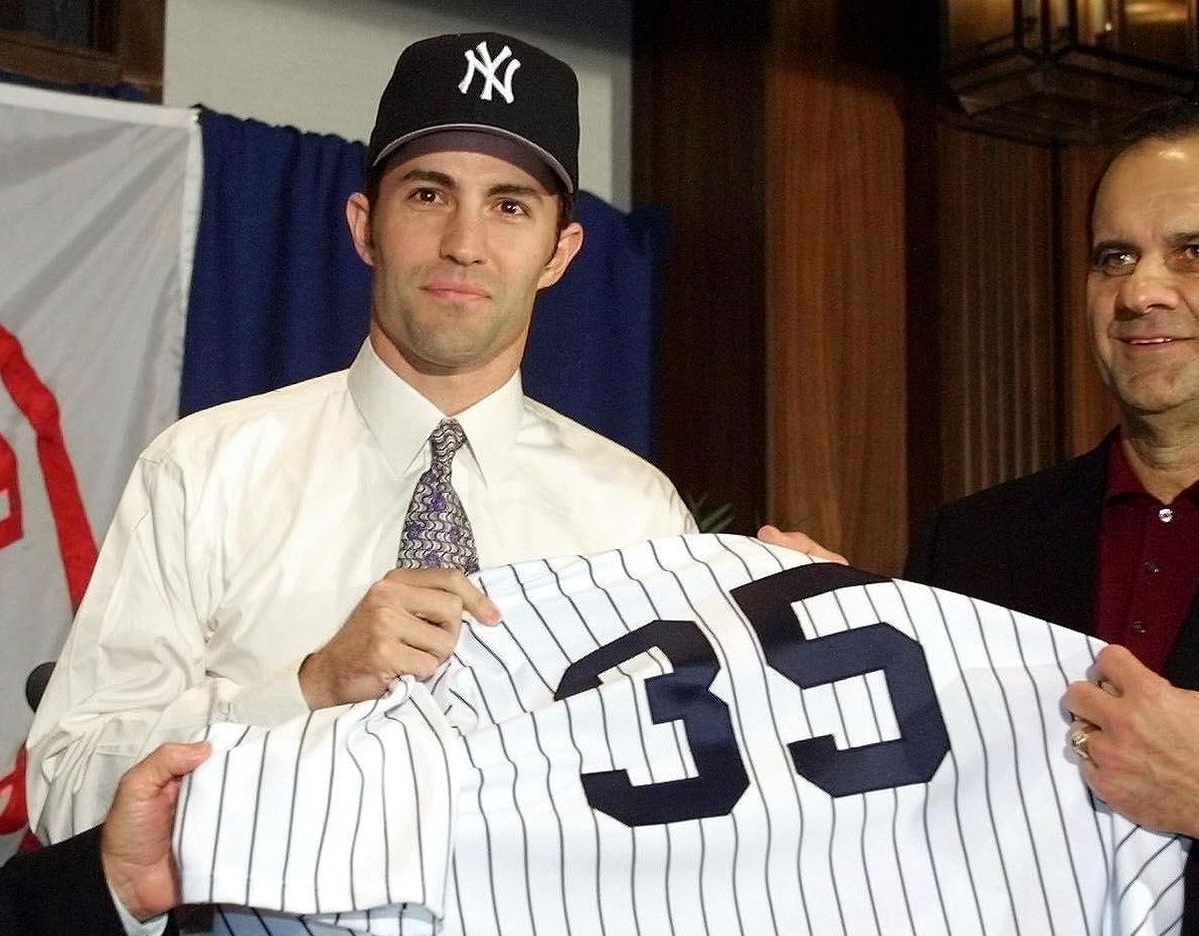
During the offseason, Mike Mussina’s request for a five-year, $60 million contract was denied by the Orioles during spring training. He was the subject of considerable interest from large-market teams, including those from Boston and both New York clubs. Mike Mussina was determined to find an opportunity to play meaningful October baseball. Consequently, he made a significant move by signing a six-year, $88.5 million contract with the defending World Series champions, the New York Yankees.
With a stronger team supporting him, Mike Mussina’s performance improved during his first year with the Yankees. He achieved a record of 17-11 with a 3.15 ERA. He once again came tantalizingly close to pitching a perfect game, retiring the first 26 Red Sox hitters on September 2, 2001, before surrendering a ninth-inning single to Carl Everett after getting ahead in the count 1-and-2. This marked the fourth instance in his career in which he had taken a no-hitter into the eighth inning or later, making him the pitcher with the most such near-misses without completing a no-hitter. Mike Mussina, visibly distraught, refused to discuss the game with the media, further straining his already tenuous relationship with the New York press.
In 2001, Mike Mussina and the Yankees advanced to the playoffs. Mussina played a pivotal role in Game Three of the Division Series against the Oakland A’s, throwing seven shutout innings in a must-win contest. This game is particularly memorable for Derek Jeter‘s famous backhanded flip from up the first baseline, which prevented Jeremy Giambi from scoring at home plate during the seventh inning. The Yankees eventually lost the World Series to the Arizona Diamondbacks on a walk-off hit in Game Seven, marking the closest Mike Mussina would come to a World Series championship.
Mike Mussina’s next and last opportunity to win a World Series came in the 2003 season, but the Yankees had to face the Boston Red Sox in the ALCS to get there. He pitched in Games One and Four of the series, suffering losses on both occasions. In the decisive Game Seven, Mike Mussina made an appearance in relief for the first time in his career. Roger Clemens had run into trouble in the fourth inning with no outs and runners on the corners, and the Yankees were trailing 4-0. The pitcher was called upon and proceeded to strike out Jason Varitek while inducing a crucial double-play groundball from Johnny Damon, enabling him to escape the jam. He delivered three scoreless innings during the game, which the Yankees won with a walk-off home run by Aaron Boone in the 11th inning. Mike Mussina also pitched seven shutout innings to secure a victory in Game Three of the World Series against the Florida Marlins. He was lined up to pitch in Game Seven, but the series ended in six games when the Marlins clinched the championship.
Mike Mussina reached the milestone of his 200th career win early in the 2004 season, becoming the 100th pitcher to achieve this feat. In 2006, he joined the ranks of pitchers who had won 100 games for two different teams. Beyond his baseball career, Mike Mussina’s intellectual pursuits made him one of the featured celebrities in the crossword-puzzle documentary film “Wordplay,” which received a theatrical release and grossed over $3 million.
After Mike Mussina’s Yankees contract concluded following the 2006 season, he re-signed with the team during the offseason, agreeing to a two-year, $23 million deal. His pursuit of the 250th career win began in the 2007 season, as he started with 239 wins. The 2007 season proved to be the most challenging of Mussina’s career. Mike Mussina pitched to a career-worst 5.33 ERA and briefly faced demotion to the bullpen in late August. However, a subsequent injury created an opening in the rotation, and the pitcher capitalized on this opportunity by altering his pitching philosophy. He began attacking the inside corner instead of relying heavily on the outside edge of the plate. Mike Mussina won three games down the stretch, reaching the milestone of 250 wins by the end of the season.
Mike Mussina continued his aggressive approach to hitters in the 2008 season and, finally, achieved his long-elusive goal of a 20-win season. He won his 20th game against the Red Sox in his final start of the season, which also marked the conclusion of his remarkable career. At the age of 39, Mike Mussina became the oldest player to win 20 games in a season for the first time in his career. Following the season, he made the decision to retire from baseball, making him one of only three pitchers to retire after a 20-win season.
The legacy of Mike Mussina
During the early stages of his career, Mike Mussina boasted a diverse pitching repertoire, which included a four-seam fastball that could reach speeds of up to 95 mph. He also featured a two-seam fastball, a slider, a changeup, and a highly effective knuckle-curve. Mike Mussina’s approach on the mound was characterized by finesse, and as he ascended through the Orioles’ organization, he was frequently likened to the legendary Jim Palmer. His ability to make real-time adjustments during games was widely praised, allowing him to compensate for days when his top form eluded him.
Mike Mussina’s sustained success can be largely attributed to his knack for adapting his pitching style. He introduced a splitter into his arsenal and replaced his knuckle-curve with a more conventional curveball. As his career progressed, Mike Mussina honed his skills in varying the speeds of his breaking pitches and altering his arm angles to confound opposing batters, thereby compensating for the waning velocity of his fastball.
During spring training in 2006, Yankees catcher Jorge Posada astutely observed the unique grip Mike Mussina employed for his changeup and promptly launched a home run off that very pitch during an intra-squad game. Posada informed Mussina of the potential telltale sign, prompting the pitcher to adjust his grip. The modified changeup baffled opposing batters, who found it challenging to discern, and it emerged as a key factor in Mike Mussina’s success that season.
His exceptional performance in 2008 can be attributed to a change in his pitching approach. In contrast to his earlier reputation for pinpointing the outside corner of the plate with a mid-90s four-seam fastball, Mike Mussina transitioned to working both sides of the plate with his now slightly slower upper-80s fastball. Additionally, he frequently employed a two-seam grip while throwing the fastball, giving it late-breaking movement. Despite the reduced velocity of his fastball, Mike Mussina preserved a significant variation in pitch speed by also decreasing the velocity of his changeup. Notably, his resurgence also coincided with excellent control, with fewer walks issued than ever before, and an evolution into a ground-ball pitcher, a departure from his previous approach. Throughout his career, Mike Mussina consistently demonstrated sound fundamentals. He issued few walks, excelled at holding baserunners, and displayed exceptional fielding abilities.
Following his retirement, Mike Mussina earned a series of prestigious accolades, including induction into the Orioles Hall of Fame in 2012, the Rochester Red Wings Hall of Fame in 2013, the Little League Hall of Excellence in 2014, and the NCAA Silver Anniversary Award in 2015.
Mike Mussina’s illustrious career received further validation when he was elected to the Baseball Hall of Fame in 2019, achieving this honor in his sixth year on the ballot. Despite detractors highlighting his lack of round statistical benchmarks such as 300 wins and 3,000 strikeouts, in addition to noting that his career ERA of 3.68 was the second highest among pitchers in the Hall of Fame, voters appeared to appreciate his value in the context of the high-scoring era in which he played. Mike Mussina’s career bWAR (wins above replacement as calculated by Baseball-Reference.com) of 82.7 ranks as the 24th highest of all time among pitchers. Even his seemingly elevated ERA was 23 percent better than the league average, underscoring his enduring impact on the game.
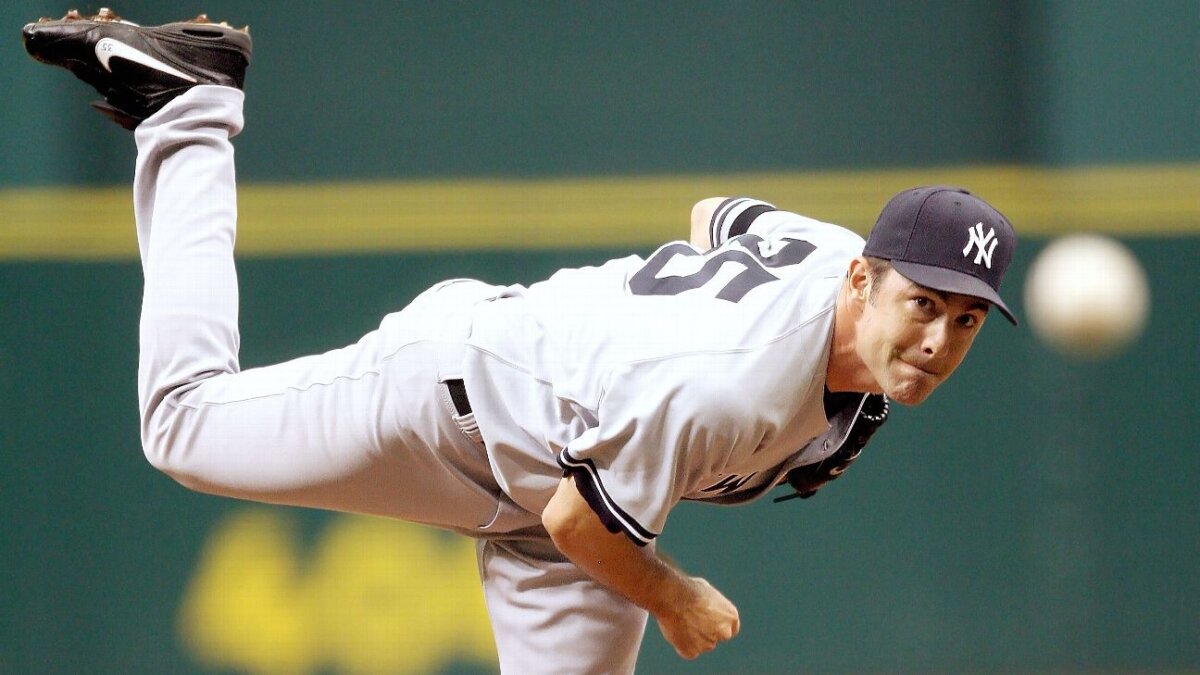
Mike Mussina’s illustrious career featured several near-perfect games:
1. On July 17, 1992, he began by setting down the first 12 Texas Rangers batters before conceding a double to Kevin Reimer. Mike Mussina went on to retire the remaining 15 batters, culminating in a one-hit 8–0 shutout.
2. May 30, 1997, witnessed his remarkable performance as he retired the first 25 Cleveland Indians hitters. However, he allowed a single to Sandy Alomar Jr. with just one out in the ninth inning. Nevertheless, Mike Mussina rebounded with two strikeouts to secure a one-hit 3–0 shutout.
3. On August 4, 1998, the pitcher maintained his near-perfection by retiring the first 23 Detroit Tigers batters. He then yielded a double to Frank Catalanotto with two outs in the eighth inning. Mike Mussina managed to preserve his shutout, allowing only two hits in the eventual 4–0 victory.
4. August 1, 2000, marked another outstanding performance as Mike Mussina pitched a one-hitter against the Minnesota Twins.
5. On September 2, 2001, Mike Mussina achieved a remarkable feat by retiring the initial 26 Boston Red Sox batters he faced. His pursuit of perfection was thwarted when pinch-hitter Carl Everett (batting for Joe Oliver) managed to put the count at 1-and-2 before hitting a single to left-center field. Mike Mussina, however, struck out the subsequent batter, Trot Nixon, concluding the game with a one-hit 1–0 shutout. The opposing pitcher was David Cone, known for throwing the last perfect game at the time, which occurred on July 18, 1999. Even though Mike Mussina didn’t attain perfection, his performance was deemed special enough to merit an appendix chapter in James Buckley Jr.’s 2002 book titled “Perfect: The Inside Story of Baseball’s Sixteen Perfect Games.”
Mike Mussina’s remarkable career achievements include:
– Seven-time recipient of the prestigious Gold Glove award for his fielding excellence.
– Consistently placed among the top five in Cy Young Award voting on six different occasions.
– Named a First-Team American League All-Star starting pitcher by Baseball America in 1994.
– Honored as a Second-Team American League All-Star starting pitcher by Baseball America in 1999.
– Led the American League in win-loss percentage with an impressive .783 in 1992.
– Dominated the American League in various categories in 1995, leading in wins (19), walks per nine innings (2.03), and shutouts (4).
– Showcased his durability by leading the American League in games started with 36 appearances in 1996.
– Demonstrated his endurance by topping the American League in innings pitched with 237 and two-thirds innings in 2000.
– Achieved the pinnacle of baseball by reaching the World Series with the New York Yankees in both 2001 and 2003.
– Displayed consistent excellence by winning 15 or more games in a season a remarkable 11 times during his career.
– Secured one 20-win season (in 2008), along with two 19-win seasons, three 18-win seasons, and two 17-win seasons, underscoring his status as a dominant force in Major League Baseball.
Greatest Moments
- 1991 Pitcher of the Year International League Rochester Red Wings
- 5-time AL All-Star (1992-1994, 1997 & 1999)
- 7-time AL Gold Glove Winner (1996-1999, 2001, 2003 & 2008)
- AL Wins Leader (1995)
- AL Winning Percentage Leader (1992)
- AL Innings Pitched Leader (2000)
- AL Shutouts Leader (1995)
- 15 Wins Seasons: 11 (1992, 1994-1997, 1999, 2001-2003, 2006 & 2008)
- 20 Wins Seasons: 1 (2008)
- 200 Innings Pitched Seasons: 11 (1992, 1995-2003 & 2008)
- 200 Strikeouts Seasons: 4 (1996, 1997, 2000 & 2001)
- Baseball Hall of Fame: Class of 2019
FAQs about Mike Mussina
What is Mike Mussina doing now?
Mussina recently accepted the position of varsity boys basketball coach at Montoursville Area High School.
What team did Mike Mussina go into the Hall of Fame with?
Orioles and Yankees
Where is Mike Mussina now?
He still resides in his hometown of Montoursville.
What year did Mike Mussina come to the Yankees?
Fall of 2000
What years did Mike Mussina play for the Yankees?
2001–2008
How old was Mike Mussina when he retired?
39 years
What number did Mike Mussina wear?
25
What made Mike Mussina good?
He made two College World Series appearances and was selected as an All-American.
How many years was Mike Mussina on the Hall of Fame ballot?
Mussina was elected to HOF in the sixth year on ballot.
How much is Mike Mussina worth?
Net worth of $70 million dollars.
How did Mike Mussina get into Hall of Fame?
Mussina was elected to the Hall of Fame in 2019.
How many world series did Mike Mussina win?
Never led to any World Series titles
What hat Mike Mussina did use?
He used a hat that didn’t feature any team logo.
Where does Mike Mussina live?
Montoursville
What number did Mike Mussina wear in New York?
No. 35
How many votes did Mike Mussina get?
76.7 percent of vote
What year did Mike Mussina become Hall of Fame eligible?
The Hall of Fame in 2019
How many wins did Mike Mussina have in his career?
270 wins
How many years did Mike Mussina play for each team?
First 10 seasons for the Baltimore Orioles and the final eight with the New York Yankees.
What year did Mike Mussina retire?
November 20, 2008
How old is Mike Mussina?
54 years as of 2023.
Who inducted Mike Mussina?
Mussina earned his induction into the Hall of Fame alongside notable figures in baseball history, including his former Yankees teammate Mariano Rivera, the revered Phillies and Blue Jays ace Roy Halladay, the accomplished Mariners designated hitter Edgar Martinez, and selections made by the Today’s Game Era Committee, namely Lee Smith and Harold Baines.
Why is Mike Mussina such a jerk?
It’s important to understand that Mussina’s hamstring injury, like the others affecting many Yankees players, can happen to anyone. However, it’s not fair to label Mussina as a “sissy” because of it.
What hat does Mike Mussina wear in the Hall of Fame?
Neither the Yankees nor Orioles cap on his plaque
How many one hitters does Mike Mussina have?
Four
Where did Mike Mussina live while playing for the Yankees?
Montoursville
How tall is Mike Mussina?
1.88 m
The Stats
| SUMMARY | WAR | W | L | ERA | G | GS | SV | IP | SO | WHIP |
| Career | 82.8 | 270 | 153 | 3.68 | 537 | 536 | 0 | 3562.2 | 2813 | 1.192 |
Mike Mussina’s Standard Pitching
| Year | W | L | W-L% | ERA | G | GS | GF | CG | SHO | SV | IP | H | R | ER | HR | BB | IBB | SO | HBP | BK | WP | BF | ERA+ | FIP | WHIP | H9 | HR9 | BB9 | SO9 | SO/W |
| 1991 | 4 | 5 | 0.444 | 2.87 | 12 | 12 | 0 | 2 | 0 | 0 | 87.2 | 77 | 31 | 28 | 7 | 21 | 0 | 52 | 1 | 1 | 3 | 349 | 139 | 3.46 | 1.118 | 7.9 | 0.7 | 2.2 | 5.3 | 2.48 |
| 1992 | 18 | 5 | 0.783 | 2.54 | 32 | 32 | 0 | 8 | 4 | 0 | 241 | 212 | 70 | 68 | 16 | 48 | 2 | 130 | 2 | 0 | 6 | 957 | 157 | 3.19 | 1.079 | 7.9 | 0.6 | 1.8 | 4.9 | 2.71 |
| 1993 | 14 | 6 | 0.7 | 4.46 | 25 | 25 | 0 | 3 | 2 | 0 | 167.2 | 163 | 84 | 83 | 20 | 44 | 2 | 117 | 3 | 0 | 5 | 693 | 100 | 3.98 | 1.235 | 8.7 | 1.1 | 2.4 | 6.3 | 2.66 |
| 1994 | 16 | 5 | 0.762 | 3.06 | 24 | 24 | 0 | 3 | 0 | 0 | 176.1 | 163 | 63 | 60 | 19 | 42 | 1 | 99 | 1 | 0 | 0 | 712 | 164 | 4.14 | 1.163 | 8.3 | 1 | 2.1 | 5.1 | 2.36 |
| 1995 | 19 | 9 | 0.679 | 3.29 | 32 | 32 | 0 | 7 | 4 | 0 | 221.2 | 187 | 86 | 81 | 24 | 50 | 4 | 158 | 1 | 0 | 2 | 882 | 145 | 3.78 | 1.069 | 7.6 | 1 | 2 | 6.4 | 3.16 |
| 1996 | 19 | 11 | 0.633 | 4.81 | 36 | 36 | 0 | 4 | 1 | 0 | 243.1 | 264 | 137 | 130 | 31 | 69 | 0 | 204 | 3 | 0 | 3 | 1039 | 103 | 4.04 | 1.368 | 9.8 | 1.1 | 2.6 | 7.5 | 2.96 |
| 1997 | 15 | 8 | 0.652 | 3.2 | 33 | 33 | 0 | 4 | 1 | 0 | 224.2 | 197 | 87 | 80 | 27 | 54 | 3 | 218 | 3 | 0 | 5 | 905 | 137 | 3.49 | 1.117 | 7.9 | 1.1 | 2.2 | 8.7 | 4.04 |
| 1998 | 13 | 10 | 0.565 | 3.49 | 29 | 29 | 0 | 4 | 2 | 0 | 206.1 | 189 | 85 | 80 | 22 | 41 | 3 | 175 | 4 | 0 | 10 | 835 | 130 | 3.48 | 1.115 | 8.2 | 1 | 1.8 | 7.6 | 4.27 |
| 1999 | 18 | 7 | 0.72 | 3.5 | 31 | 31 | 0 | 4 | 0 | 0 | 203.1 | 207 | 88 | 79 | 16 | 52 | 0 | 172 | 1 | 0 | 2 | 842 | 133 | 3.25 | 1.274 | 9.2 | 0.7 | 2.3 | 7.6 | 3.31 |
| 2000 | 11 | 15 | 0.423 | 3.79 | 34 | 34 | 0 | 6 | 1 | 0 | 237.2 | 236 | 105 | 100 | 28 | 46 | 0 | 210 | 3 | 0 | 3 | 987 | 125 | 3.52 | 1.187 | 8.9 | 1.1 | 1.7 | 8 | 4.57 |
| 2001 | 17 | 11 | 0.607 | 3.15 | 34 | 34 | 0 | 4 | 3 | 0 | 228.2 | 202 | 87 | 80 | 20 | 42 | 2 | 214 | 4 | 0 | 6 | 909 | 143 | 2.92 | 1.067 | 8 | 0.8 | 1.7 | 8.4 | 5.1 |
| 2002 | 18 | 10 | 0.643 | 4.05 | 33 | 33 | 0 | 2 | 2 | 0 | 215.2 | 208 | 103 | 97 | 27 | 48 | 1 | 182 | 5 | 0 | 7 | 886 | 109 | 3.64 | 1.187 | 8.7 | 1.1 | 2 | 7.6 | 3.79 |
| 2003 | 17 | 8 | 0.68 | 3.4 | 31 | 31 | 0 | 2 | 1 | 0 | 214.2 | 192 | 86 | 81 | 21 | 40 | 4 | 195 | 3 | 0 | 4 | 855 | 130 | 3.09 | 1.081 | 8 | 0.9 | 1.7 | 8.2 | 4.88 |
| 2004 | 12 | 9 | 0.571 | 4.59 | 27 | 27 | 0 | 1 | 0 | 0 | 164.2 | 178 | 91 | 84 | 22 | 40 | 1 | 132 | 2 | 0 | 5 | 697 | 98 | 3.95 | 1.324 | 9.7 | 1.2 | 2.2 | 7.2 | 3.3 |
| 2005 | 13 | 8 | 0.619 | 4.41 | 30 | 30 | 0 | 2 | 2 | 0 | 179.2 | 199 | 93 | 88 | 23 | 47 | 0 | 142 | 7 | 0 | 2 | 766 | 96 | 4.01 | 1.369 | 10 | 1.2 | 2.4 | 7.1 | 3.02 |
| 2006 | 15 | 7 | 0.682 | 3.51 | 32 | 32 | 0 | 1 | 0 | 0 | 197.1 | 184 | 88 | 77 | 22 | 35 | 1 | 172 | 5 | 0 | 3 | 804 | 129 | 3.46 | 1.11 | 8.4 | 1 | 1.6 | 7.8 | 4.91 |
| 2007 | 11 | 10 | 0.524 | 5.15 | 28 | 27 | 0 | 0 | 0 | 0 | 152 | 188 | 90 | 87 | 14 | 35 | 2 | 91 | 4 | 0 | 1 | 656 | 88 | 4.01 | 1.467 | 11.1 | 0.8 | 2.1 | 5.4 | 2.6 |
| 2008 | 20 | 9 | 0.69 | 3.37 | 34 | 34 | 0 | 0 | 0 | 0 | 200.1 | 214 | 85 | 75 | 17 | 31 | 3 | 150 | 8 | 0 | 4 | 819 | 131 | 3.32 | 1.223 | 9.6 | 0.8 | 1.4 | 6.7 | 4.84 |
| 18 Yrs | 270 | 153 | 0.638 | 3.68 | 537 | 536 | 0 | 57 | 23 | 0 | 3562.2 | 3460 | 1559 | 1458 | 376 | 785 | 29 | 2813 | 60 | 1 | 71 | 14593 | 123 | 3.57 | 1.192 | 8.7 | 0.9 | 2 | 7.1 | 3.58 |
| 162 Game Avg. | 17 | 10 | 0.638 | 3.68 | 34 | 34 | 0 | 4 | 1 | 0 | 226 | 219 | 99 | 92 | 24 | 50 | 2 | 178 | 4 | 0 | 4 | 925 | 123 | 3.57 | 1.192 | 8.7 | 0.9 | 2 | 7.1 | 3.58 |
| W | L | W-L% | ERA | G | GS | GF | CG | SHO | SV | IP | H | R | ER | HR | BB | IBB | SO | HBP | BK | WP | BF | ERA+ | FIP | WHIP | H9 | HR9 | BB9 | SO9 | SO/W | |
| BAL (10 yrs) | 147 | 81 | 0.645 | 3.53 | 288 | 288 | 0 | 45 | 15 | 0 | 2009.2 | 1895 | 836 | 789 | 210 | 467 | 15 | 1535 | 22 | 1 | 39 | 8201 | 130 | 3.63 | 1.175 | 8.5 | 0.9 | 2.1 | 6.9 | 3.29 |
| NYY (8 yrs) | 123 | 72 | 0.631 | 3.88 | 249 | 248 | 0 | 12 | 8 | 0 | 1553 | 1565 | 723 | 669 | 166 | 318 | 14 | 1278 | 38 | 0 | 32 | 6392 | 114 | 3.5 | 1.212 | 9.1 | 1 | 1.8 | 7.4 | 4.02 |
Mike Mussina’s Postseason Pitching
| Year | W | L | W-L% | ERA | G | GS | GF | CG | SHO | SV | IP | H | R | ER | HR | BB | IBB | SO | HBP | BK | WP | BF | WHIP | H9 | HR9 | BB9 | SO9 | SO/W | WPA | cWPA |
| 1996 | 0 | 0 | 4.5 | 1 | 1 | 0 | 0 | 0 | 0 | 6 | 7 | 4 | 3 | 1 | 2 | 0 | 6 | 0 | 0 | 0 | 27 | 1.5 | 10.5 | 1.5 | 3 | 9 | 3 | -0.05 | -0.40% | |
| 1996 | 0 | 1 | 0 | 5.87 | 1 | 1 | 0 | 0 | 0 | 0 | 7.2 | 8 | 5 | 5 | 1 | 2 | 0 | 6 | 0 | 0 | 0 | 32 | 1.304 | 9.4 | 1.2 | 2.3 | 7 | 3 | -0.23 | -5.00% |
| 1997 | 2 | 0 | 1 | 1.93 | 2 | 2 | 0 | 0 | 0 | 0 | 14 | 7 | 3 | 3 | 3 | 3 | 0 | 16 | 0 | 0 | 0 | 52 | 0.714 | 4.5 | 1.9 | 1.9 | 10.3 | 5.33 | 0.49 | 5.10% |
| 1997 | 0 | 0 | 0.6 | 2 | 2 | 0 | 0 | 0 | 0 | 15 | 4 | 1 | 1 | 0 | 4 | 0 | 25 | 0 | 0 | 0 | 53 | 0.533 | 2.4 | 0 | 2.4 | 15 | 6.25 | 0.81 | 18.30% | |
| 2001 | 1 | 0 | 1 | 0 | 1 | 1 | 0 | 0 | 0 | 0 | 7 | 4 | 0 | 0 | 0 | 1 | 0 | 4 | 0 | 0 | 0 | 25 | 0.714 | 5.1 | 0 | 1.3 | 5.1 | 4 | 0.5 | 3.10% |
| 2001 | 1 | 0 | 1 | 3 | 1 | 1 | 0 | 0 | 0 | 0 | 6 | 4 | 2 | 2 | 1 | 1 | 0 | 3 | 1 | 0 | 0 | 24 | 0.833 | 6 | 1.5 | 1.5 | 4.5 | 3 | 0.16 | 2.60% |
| 2001 | 0 | 1 | 0 | 4.09 | 2 | 2 | 0 | 0 | 0 | 0 | 11 | 11 | 7 | 5 | 4 | 4 | 3 | 14 | 1 | 0 | 1 | 50 | 1.364 | 9 | 3.3 | 3.3 | 11.5 | 3.5 | -0.16 | -2.90% |
| 2002 | 0 | 0 | 9 | 1 | 1 | 0 | 0 | 0 | 0 | 4 | 6 | 4 | 4 | 1 | 0 | 0 | 2 | 1 | 0 | 0 | 19 | 1.5 | 13.5 | 2.3 | 0 | 4.5 | -0.09 | -1.20% | ||
| 2003 | 0 | 1 | 0 | 3.86 | 1 | 1 | 0 | 0 | 0 | 0 | 7 | 7 | 3 | 3 | 0 | 3 | 1 | 6 | 0 | 0 | 0 | 30 | 1.429 | 9 | 0 | 3.9 | 7.7 | 2 | 0 | -0.20% |
| 2003 | 0 | 2 | 0 | 4.11 | 3 | 2 | 0 | 0 | 0 | 0 | 15.1 | 16 | 7 | 7 | 5 | 4 | 1 | 17 | 0 | 0 | 0 | 64 | 1.304 | 9.4 | 2.9 | 2.3 | 10 | 4.25 | -0.06 | 3.10% |
| 2003 | 1 | 0 | 1 | 1.29 | 1 | 1 | 0 | 0 | 0 | 0 | 7 | 7 | 1 | 1 | 0 | 1 | 1 | 9 | 0 | 0 | 0 | 29 | 1.143 | 9 | 0 | 1.3 | 11.6 | 9 | 0.32 | 11.20% |
| 2004 | 0 | 1 | 0 | 2.57 | 1 | 1 | 0 | 0 | 0 | 0 | 7 | 7 | 2 | 2 | 1 | 1 | 0 | 7 | 0 | 0 | 0 | 27 | 1.143 | 9 | 1.3 | 1.3 | 9 | 7 | 0.12 | 1.10% |
| 2004 | 1 | 0 | 1 | 4.26 | 2 | 2 | 0 | 0 | 0 | 0 | 12.2 | 10 | 6 | 6 | 0 | 2 | 0 | 15 | 0 | 0 | 0 | 51 | 0.947 | 7.1 | 0 | 1.4 | 10.7 | 7.5 | 0.25 | 3.30% |
| 2005 | 1 | 1 | 0.5 | 5.4 | 2 | 2 | 0 | 0 | 0 | 0 | 8.1 | 11 | 5 | 5 | 1 | 1 | 0 | 7 | 0 | 0 | 0 | 38 | 1.44 | 11.9 | 1.1 | 1.1 | 7.6 | 7 | -0.16 | -7.20% |
| 2006 | 0 | 1 | 0 | 5.14 | 1 | 1 | 0 | 0 | 0 | 0 | 7 | 8 | 4 | 4 | 1 | 0 | 0 | 5 | 0 | 0 | 1 | 30 | 1.143 | 10.3 | 1.3 | 0 | 6.4 | -0.12 | -1.20% | |
| 2007 | 0 | 0 | 3.86 | 1 | 0 | 0 | 0 | 0 | 0 | 4.2 | 4 | 2 | 2 | 0 | 4 | 1 | 3 | 0 | 0 | 0 | 20 | 1.714 | 7.7 | 0 | 7.7 | 5.8 | 0.75 | -0.04 | -0.50% | |
| 9 Yrs (16 Series) | 7 | 8 | 0.467 | 3.42 | 23 | 21 | 0 | 0 | 0 | 0 | 139.2 | 121 | 56 | 53 | 19 | 33 | 7 | 145 | 3 | 0 | 2 | 571 | 1.103 | 7.8 | 1.2 | 2.1 | 9.3 | 4.39 | 1.76 | 29.10% |
| 9 ALDS | 4 | 4 | 0.5 | 3.6 | 11 | 10 | 0 | 0 | 0 | 0 | 65 | 61 | 27 | 26 | 8 | 15 | 2 | 56 | 1 | 0 | 1 | 268 | 1.169 | 8.4 | 1.1 | 2.1 | 7.8 | 3.73 | 0.65 | -1.40% |
| 5 ALCS | 2 | 3 | 0.4 | 3.34 | 9 | 8 | 0 | 0 | 0 | 0 | 56.2 | 42 | 21 | 21 | 7 | 13 | 1 | 66 | 1 | 0 | 0 | 224 | 0.971 | 6.7 | 1.1 | 2.1 | 10.5 | 5.08 | 0.93 | 22.10% |
| 2 WS | 1 | 1 | 0.5 | 3 | 3 | 3 | 0 | 0 | 0 | 0 | 18 | 18 | 8 | 6 | 4 | 5 | 4 | 23 | 1 | 0 | 1 | 79 | 1.278 | 9 | 2 | 2.5 | 11.5 | 4.6 | 0.17 | 8.30% |
Career graph
| Hall of Fame | All-Star Games | Awards | MVP (rank, share) |
| 2014 BBWAA (20.3%) 2015 BBWAA (24.6%) 2016 BBWAA (43.0%) 2017 BBWAA (51.8%) 2018 BBWAA (63.5%) 2019 BBWAA (76.7%) Selected to HOF in 2019 by BBWAA | 1992 * 1993 1994 * 1997 1999 * | 1995 AL TSN All-Star | 1992 AL (21, 1%) 1994 AL (20, 2%) 2008 AL (19, 1%) 0.04 Career Shares (1290th) |
| Cy Young (rank, share) | Gold Gloves | Weekly Awards | Wins Above Replacement |
| 1992 AL (4, 19%) 1994 AL (4, 16%) 1995 AL (5, 10%) 1996 AL (5, 4%) 1997 AL (6, 1%) 1999 AL (2, 39%) 2000 AL (6, 1%) 2001 AL (5, 1%) 2008 AL (6, 1%) 0.92 Career Shares (74th) | 1996 AL (P) 1997 AL (P) 1998 AL (P) 1999 AL (P) 2001 AL (P) 2003 AL (P) 2008 AL (P) All multiple winners | 2001 May 6th AL Player of the Week 2001 Sep 2nd AL Player of the Week 2003 Aug 17th AL Player of the Week | 1992 AL 8.2 (2nd) 1994 AL 5.4 (8th) 1995 AL 6.1 (9th) 2001 AL 7.1 (6th) 2003 AL 6.5 (6th) Career 82.8 (60th) |
| WAR for Pitchers | Earned Run Average | Wins | Win-Loss % |
| 1992 AL 8.2 (2nd) 1994 AL 5.4 (4th) 1995 AL 6.1 (3rd) 1997 AL 5.5 (8th) 1998 AL 5.0 (7th) 1999 AL 4.4 (10th) 2000 AL 5.7 (3rd) 2001 AL 7.1 (1st) 2003 AL 6.6 (5th) 2006 AL 5.0 (5th) 2008 AL 5.1 (7th) Career 82.8 (23rd) | 1992 AL 2.54 (3rd) 1994 AL 3.06 (4th) 1995 AL 3.29 (4th) 1997 AL 3.20 (6th) 1998 AL 3.49 (6th) 1999 AL 3.50 (3rd) 2000 AL 3.79 (3rd) 2001 AL 3.15 (2nd) 2003 AL 3.40 (8th) 2006 AL 3.51 (4th) 2008 AL 3.37 (6th) | 1992 AL 18 (4th) 1994 AL 16 (2nd) 1995 AL 19 (1st) 1996 AL 19 (3rd) 1999 AL 18 (2nd) 2001 AL 17 (6th) 2002 AL 18 (8th) 2003 AL 17 (5th) 2008 AL 20 (2nd) Career 270 (33rd) | 1992 AL .783 (1st) 1993 AL .700 (7th) 1994 AL .762 (5th) 1995 AL .679 (9th) 1996 AL .633 (8th) 1999 AL .720 (3rd) 2003 AL .680 (10th) 2006 AL .682 (5th) 2008 AL .690 (8th) Career .638 (50th) |
| Walks & Hits per IP | Hits per 9 IP | Bases On Balls per 9 IP | Strikeouts per 9 IP |
| 1992 AL 1.079 (2nd) 1993 AL 1.235 (10th) 1994 AL 1.163 (4th) 1995 AL 1.069 (2nd) 1997 AL 1.117 (3rd) 1998 AL 1.115 (4th) 1999 AL 1.274 (5th) 2000 AL 1.187 (2nd) 2001 AL 1.067 (2nd) 2003 AL 1.081 (4th) 2006 AL 1.110 (3rd) 2008 AL 1.223 (10th) Career 1.192 (143rd) | 1992 AL 7.917 (8th) 1995 AL 7.592 (4th) 1997 AL 7.892 (6th) 1998 AL 8.244 (8th) 1999 AL 9.162 (10th) 2000 AL 8.937 (9th) 2001 AL 7.950 (7th) 2003 AL 8.050 (6th) 2006 AL 8.392 (3rd) | 1992 AL 1.793 (2nd) 1993 AL 2.362 (6th) 1994 AL 2.144 (6th) 1995 AL 2.030 (1st) 1996 AL 2.552 (8th) 1997 AL 2.163 (6th) 1998 AL 1.788 (4th) 1999 AL 2.302 (5th) 2000 AL 1.742 (3rd) 2001 AL 1.653 (2nd) 2002 AL 2.003 (9th) 2003 AL 1.677 (4th) 2004 AL 2.186 (8th) 2006 AL 1.596 (3rd) 2008 AL 1.393 (2nd) Career 1.983 (95th) | 1996 AL 7.545 (5th) 1997 AL 8.733 (4th) 1998 AL 7.633 (6th) 1999 AL 7.613 (6th) 2000 AL 7.952 (6th) 2001 AL 8.423 (5th) 2002 AL 7.595 (3rd) 2003 AL 8.175 (3rd) 2005 AL 7.113 (7th) 2006 AL 7.845 (9th) Career 7.106 (176th) |
| Innings Pitched | Strikeouts | Games Started | Complete Games |
| 1992 AL 241.0 (8th) 1994 AL 176.3 (5th) 1995 AL 221.7 (2nd) 1996 AL 243.3 (4th) 1997 AL 224.7 (8th) 2000 AL 237.7 (1st) 2001 AL 228.7 (7th) 2003 AL 214.7 (9th) Career 3,562.7 (67th) | 1995 AL 158 (7th) 1996 AL 204 (4th) 1997 AL 218 (4th) 1998 AL 175 (8th) 1999 AL 172 (6th) 2000 AL 210 (3rd) 2001 AL 214 (2nd) 2002 AL 182 (3rd) 2003 AL 195 (4th) 2006 AL 172 (8th) Career 2,813 (24th) | 1995 AL 32 (2nd) 1996 AL 36 (1st) 2000 AL 34 (3rd) 2001 AL 34 (3rd) 2002 AL 33 (7th) 2008 AL 34 (1st) Career 536 (36th) | 1992 AL 8 (7th) 1995 AL 7 (2nd) 1997 AL 4 (6th) 1999 AL 4 (7th) 2000 AL 6 (3rd) 2001 AL 4 (5th) 2005 AL 2 (10th) |
| Shutouts | Home Runs | Hits | Strikeouts / Base On Balls |
| 1992 AL 4 (2nd) 1993 AL 2 (5th) 1995 AL 4 (1st) 1996 AL 1 (6th) 1997 AL 1 (9th) 1998 AL 2 (5th) 2000 AL 1 (4th) 2001 AL 3 (2nd) 2002 AL 2 (2nd) 2003 AL 1 (6th) 2005 AL 2 (2nd) Career 23 (204th) | 1995 AL 24 (8th) 1996 AL 31 (7th) Career 376 (20th) | 1996 AL 264 (2nd) 2000 AL 236 (5th) 2008 AL 214 (9th) Career 3,460 (71st) | 1992 AL 2.708 (5th) 1993 AL 2.659 (5th) 1994 AL 2.357 (9th) 1995 AL 3.160 (2nd) 1996 AL 2.957 (2nd) 1997 AL 4.037 (3rd) 1998 AL 4.268 (2nd) 1999 AL 3.308 (3rd) 2000 AL 4.565 (3rd) 2001 AL 5.095 (2nd) 2002 AL 3.792 (4th) 2003 AL 4.875 (3rd) 2004 AL 3.300 (6th) 2006 AL 4.914 (3rd) 2008 AL 4.839 (4th) Career 3.583 (35th) |
| Home Runs per 9 IP | Losses | Earned Runs | Wild Pitches |
| 1999 AL 0.708 (2nd) 2001 AL 0.787 (10th) 2008 AL 0.764 (8th) | 2000 AL 15 (2nd) Career 153 (154th) | 1996 AL 130 (2nd) Career 1,458 (47th) | 1998 AL 10 (8th) |
| Batters Faced | Adjusted ERA+ | Fielding Independent Pitching | Adj. Pitching Runs |
| 1994 AL 712 (10th) 1995 AL 882 (6th) 1996 AL 1,039 (4th) 2000 AL 987 (2nd) Career 14,593 (73rd) | 1992 AL 157 (3rd) 1994 AL 164 (4th) 1995 AL 145 (4th) 1997 AL 137 (7th) 1998 AL 130 (6th) 1999 AL 133 (4th) 2000 AL 125 (5th) 2001 AL 143 (2nd) 2003 AL 130 (9th) 2006 AL 129 (4th) 2008 AL 131 (6th) Career 123 (100th) | 1992 AL 3.19 (8th) 1995 AL 3.78 (6th) 1996 AL 4.04 (7th) 1997 AL 3.49 (6th) 1998 AL 3.48 (4th) 1999 AL 3.25 (2nd) 2000 AL 3.52 (3rd) 2001 AL 2.92 (1st) 2002 AL 3.64 (8th) 2003 AL 3.09 (3rd) 2006 AL 3.46 (5th) 2008 AL 3.32 (5th) | 1992 AL 41 (2nd) 1994 AL 38 (3rd) 1995 AL 37 (3rd) 1997 AL 31 (7th) 1998 AL 25 (8th) 1999 AL 26 (7th) 2000 AL 28 (2nd) 2001 AL 34 (2nd) 2003 AL 26 (10th) Career 345 (19th) |
| Adj. Pitching Wins | Base-Out Runs Saved (RE24) | Win Probability Added (WPA) | Sit. Wins Saved (WPA/LI) |
| 1992 AL 4.5 (2nd) 1994 AL 3.8 (3rd) 1995 AL 3.7 (3rd) 1997 AL 3.1 (7th) 1998 AL 2.5 (8th) 1999 AL 2.5 (7th) 2000 AL 2.6 (2nd) 2001 AL 3.5 (2nd) 2003 AL 2.6 (9th) 2008 AL 2.1 (10th) Career 34.8 (24th) | 1992 AL 44.75 (1st) 1994 AL 40.35 (3rd) 1995 AL 44.70 (2nd) 1997 AL 36.61 (6th) 1998 AL 30.98 (6th) 1999 AL 29.97 (6th) 2000 AL 35.04 (2nd) 2001 AL 39.50 (2nd) 2003 AL 29.40 (7th) Career 412.96 (14th) | 1992 AL 4.6 (3rd) 1994 AL 4.4 (1st) 1995 AL 4.5 (3rd) 1997 AL 3.3 (9th) 2000 AL 3.1 (6th) 2001 AL 4.3 (2nd) 2003 AL 3.5 (10th) Career 40.6 (15th) | 1992 AL 3.9 (2nd) 1994 AL 3.3 (4th) 1995 AL 4.6 (2nd) 1997 AL 3.2 (5th) 1998 AL 2.5 (7th) 2000 AL 2.8 (2nd) 2001 AL 4.4 (1st) 2003 AL 3.5 (6th) 2006 AL 3.1 (3rd) Career 41.8 (13th) |
| Championship WPA (cWPA) | Base-Out Wins Saved (REW) | Assists as P | Errors Committed as P |
| 1992 AL 5.6 (4th) 1994 AL 3.5 (1st) 2001 AL 2.4 (5th) 2003 AL 2.4 (9th) Career 17.9 (171st) | 1992 AL 4.9 (1st) 1994 AL 4.0 (3rd) 1995 AL 4.5 (2nd) 1997 AL 3.8 (6th) 1998 AL 3.1 (6th) 1999 AL 3.0 (4th) 2000 AL 3.5 (2nd) 2001 AL 4.0 (2nd) 2003 AL 3.0 (8th) Career 41.9 (16th) | 1999 AL 46 (2nd) | 2005 AL 4 (2nd) |
| Double Plays Turned as P | Range Factor/9Inn as P | Range Factor/Game as P | Fielding % as P |
| 2001 AL 4 (5th) 2005 AL 5 (2nd) 2008 AL 4 (4th) | 1999 AL 2.66 (1st) | 1998 AL 1.72 (5th) 1999 AL 1.94 (3rd) | 1993 AL 1.000 (1st) 1996 AL 1.000 (1st) 1997 AL 1.000 (1st) 1998 AL 1.000 (1st) 2003 AL 1.000 (1st) 2006 AL 1.000 (1st) |
| Salary | Oldest | ||
| 1998 AL $6,755,492 (9th) 2002 AL $11,000,000 (8th) 2004 AL $16,000,000 (6th) 2005 AL $19,000,000 (4th) 2006 AL $19,000,000 (4th) | 2008 AL born 1968-12-08 (9th) |
- Categories: mike mussina
- Tags: mike mussina


 Follow Us
Follow Us